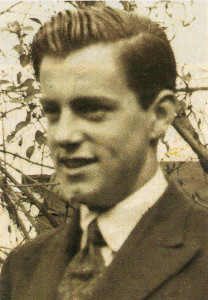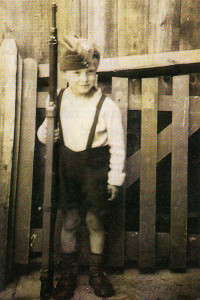
Until the May 27th, 1940,1 had only read about and seen at the cinema the opening seven months of the war. At the age of 16, it was all very exciting.
There were our victories at sea with the sinking of the Graf Spee at the River Plate. The German victories over Poland, Denmark, Norway, Holland and Belgium were worrying, but always seemed so far away and the press and wireless played them down to strengthen the nation’s moral. It was not until Dunkirk that I and many like me realised how serious it all was, especially living in Folkestone, the nearest town to the advancing German forces only 21 miles away.
In the next five months, I grew up and discovered what war was really about, experiencing grief in our family with the loss of my elder brother Oliver at Dunkirk and being bombed, shelled and mac-hine-gunned. I also learnt to hate Germans which, I regret to say, has still not completely left me.
Being at an in-between age, I felt very much out of things when I met Alfie, an 18-year-old friend of mine who told me he had joined the Home Guard and, as Folkestone was considered to be in the front line, the men were issued with uniforms and rifles! Not so the rest of the country. He also told me there was no checking on age, so being 6 foot, I advanced my age to 18 years, presented myself at the enrolling office, and joined Folkestone’s Home Guard.
Pushing open the hut door
in the Council’s builder’s yard under the railway viaduct that evening, I reported to the corporal sitting at a table at the far end of the room. “What are you doing here, Hugh?” He was the one person, outside of my family, that knew my exact date of birth. It was Mr. Hall, our “Man from the Pru’. I had also attended school with his son Dennis who was my age. He accepted my explanation, smiled and issued me with my uniform and helmet. That night, with my 303 Enfield Rifle plus five rounds of ammo, I began my guard duties. We were expected to report every evening plus the weekend and any other spare time we had available.
The following Sunday morning there was a full turnout of all the town’s HGs, in the area by the inner harbour.
Come noon, our Corporal marched us away, halting the unit at the first pub. The licensing laws were strictly adhered to in those days and, as I was under age and had never drunk alcohol or even seen the inside of a public house, my fellow HGs, knowing my predicament, quickly ushered me in. Thus my baptism to the ‘hard stuff, a half pint of shandy!
‘The Battle of Britain’ began in earnest on the July 10th but, from the fall of France until that date, ME 109s daily nipped across the Channel and dropped the odd bomb and machine gunned the town, resulting in the loss of many lives.
My main guard duties at night were in a trench facing out to sea to the east of Folkestone. We used a Boy Scouts hut to sleep in between shifts if ‘Jerry’ wasn’t too active. I was the only young man there, the others being at least 45 and over! They were all most kind to me; somehow I always had the first duty which enabled me to get a good night’s sleep.
When the Germans shelled the coast or convoys at night, you could see the bright flashes of their four large guns on the French coast. About 100 seconds later, the shells would explode, thankfully further up the coast or better still out at sea. It was the waiting time for the shells to cross the Channel that was the most frightening – you knew they were on their way.
These duties had one advantage for me. When I reported for work at Timothy Whites, the staff – all girls except for a retired pharmacist – would insist I rested. As it was a beautiful hot summer, I would borrow a deck chair, get onto the flat roof and have a grandstand view of the ‘Battle of Britain’.
With all schools in the town closed, our mother really had her hands full, especially having seven children. A lesser women, I’m sure, would have cracked, but not our mum. She didn’t panic. Meals always appeared on the table on time and, although the air raid warning siren constantly went on and off all the time, we always slept in our beds. The strength and the feeling of security she gave us during the war just couldn’t be measured.
One of my duties was to see my father to work and back at the Tontine Street branch of Timothy Whites that he managed, then on to the Sandgate Road branch where I was an apprentice. I could see the stress building up in him daily. To his great credit, he carried on his duties as an Air Raid Warden.
The family home had three near-misses. The one I remember most was the bomb that exploded on a house a few doors down from us, killing two of the occupants. Fortunately, it did not damage our house, being on the same side of the street we were protected from the blast. About thirty minutes after the bomb had hit, I was in our back garden while the fire engines were in action and the ambulance and its staff were carrying out their grim task, when I spotted an ME 109 bearing down on us. Smoke rings were coming from its wings as it started to machine gun the rescuers. I dived behind the garden wall and heard the bullets hitting the buildings about me. I remember rising with all fear gone and replaced with a burning hatred of one of the many
cruel Germans who chose to kill the innocent and near defenceless!
By August, St. Saviour’s Church had opened a school class for any of the children remaining in the area, charging a few pence per week for each child. Mother gladly enrolled her four eligible children.
We were all waiting and preparing for the invasion, not knowing that the air battles taking place by the tenacious ‘Few’ and their final victory, would frighten the enemy off.
On two or three occasions we were told to stand by ready for the invasion but who can say just what a few Home Guards could have done. We witnessed the heavy RAF bombing of Calais and Boulogne. The large fires started, were those of German invasion barges much as we had hoped.
The nuisance raids on the town continued until mid-September when London became the main target. As the bombers’ shortest route was over Folkestone, we saw a lot of action and, in daylight, observed many of them shot down or limping home.
In December, the branch of Timothy Whites where my father worked was closed and he was transferred to the Leatherhead branch. As the company was aware of dad’s nervous illness, they also transferred me to the same area and so the 1941 move to Surrey brought to an end our voluntary service in Folkestone.
Hugh Ashling









